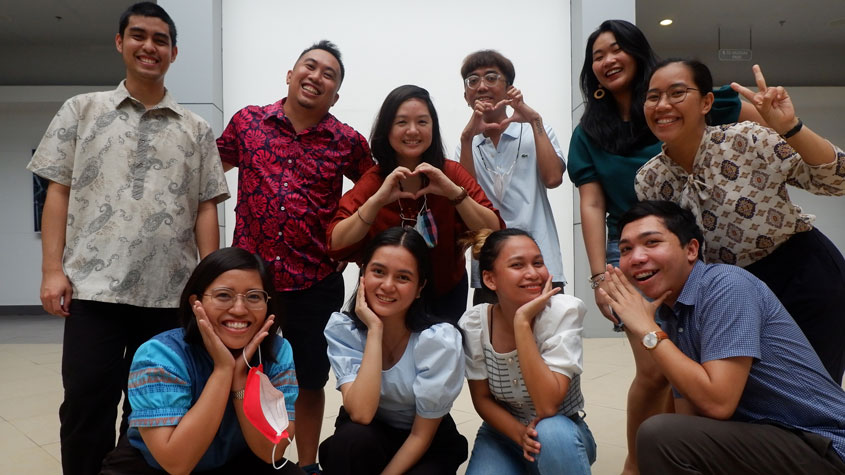Well-knit: building a stable platform for sustainable fashion in Southeast Asia
Pineapples and bananas are more than just fruits for innovative entrepreneur Noreen Marian Bautista, the co-founder of Panublix. Together with cotton, these fruit crops are the main raw materials used by the sustainable textile Filipino start up Panublix. Bautista set up the company in the Philippines in 2021 in her drive to contribute to an eco-sensitive circular economy that also preserves the unique cultural heritage of the Philippines.

Panublix has since grown into a collaborative platform for textile artisans, fashion designers, and discerning consumers who share the common goal of sustainable production and lifestyle to develop a thriving Southeast Asian textile industry.
“We bring together textile producers, rural artisans and designers in a collaborative ecosystem where they can co-create products for sustainability-minded consumers,” Bautista says.
Preserving Indigenous knowledge
The name Panublix comes from panubli-on, the local language for “precious heritage.” It underscore’s Bautista’s vision to preserve her Iloilo heritage and Indigenous knowledge through a sustainable and ethical fashion value chain.
“I was born in Iloilo, the famed the textile capital of the Philippines with a rich handloom culture. This is what inspired me to set up Panublix to promote our heritage, especially now that handwoven fabrics are making a comeback as a sustainable alternative that upholds our national pride,” says Bautista.
Panublix’s founding coincided with a post-COVID recovery trend focusing on sustainability and prioritizing the well-being of people, communities and the environment. This strategically places the start-up to benefit from the global green fashion movement, which is projected to grow to USD15 billion by 2030. The company’s farm-to-fashion value chain is designed to drastically reduce the carbon footprint by working in a closely-knit network.
“Our entire value chain is localized within a small radius. This has reduced our carbon footprint as we play our part in transitioning to a more sustainable and regenerative lifestyle. Our philosophy is one of sustainability, by moving away from fossil-fuel based production and materials like polyester that account for about 1.35 percent of global fossil fuel consumption ,” says Bautista.
Protecting intellectual property
Panublix works with smallholder farmers in the Western Visayas region of the Philippines, which is rich in natural cotton, abaca (banana) and pineapple. The company works with Philippine innovations in the production of 100 percent Philippine-made crochet and weaving yarns using cotton, abaca and pineapple fibers. Panublix is currently collaborating with research and development (R&D) institutions, such as the Philippine Textile Research Institute who currently hold the patents to the yarn blends. Bautista reveals that the company is developing its intellectual property (IP) protection strategy and building its brand through trademark protection.
“We are finalizing the registration of our trademarks to protect our IP and aim to develop a strong brand of patented textiles. This is important for brand credibility and quality assurance to market the value of our textile products, processes and cultural heritage,” says Bautista.
As a collaborative platform, the company is developing a network of weavers, artisans and raw material producers to make sustainable natural fibers that reduce the social and environmental impact of apparel production and consumption. In this way, the company is enabling designers to create sustainable fashion items while supporting the livelihoods of local artisans by buying the raw materials they produce.
Through Panublix’s transparent and collaborative platform, crafters, artisan designers and brands can access locally grown tropical textiles and artisans. The company encourages conscious consumerism by supplying high-quality, custom-woven clothing created by their network of partner artisans and designers. The company also runs the Panublix Weaving Enterprise Digital Enabler (PWEDE) program to equip textile makers and rural artisans with digital support and resources to succeed as digital entrepreneurs.
“Our farm-to-fashion collective is a win-win partnership with the artisans, farmers and designers. It supports all players at different stages of the value chain. We are also building a data-driven technology that can guide all stakeholders to a journey towards sustainability,” says Bautista.
Supporting the circular economy with regenerative textiles
Panublix is currently developing proprietary natural-fiber textiles that are unique to the Philippines. These includes regenerative yarns, which it plans to market as a tropical brand of the Philippines. Bautista explains that IP is important for start-ups that want to succeed in the highly competitive textile and fashion industries.

weaving yarns using cotton, abaca (banana) and
pineapple fibers. (Photo: Courtesy of Panublix)
“Our style of weaving is an Indigenous art that is unique to the Philippines. The weavers are also creative designers whose works, tools of trade and processes must be recognized and protected as intellectual properties to promote their businesses and brands,” says Bautista.
Bautista is, however, aware that there are still many challenges to overcome in the industry, including securing a reliable supply of quality natural raw materials.
“Food crops are given priority, so sometimes it is very difficult to convince small farmers to cultivate cash crops for the production of fibers,” says Bautista, adding that increased investment in regenerative agriculture could help attract farmers. The company needs USD 500,000 to advance its research and development and improve its production process.
“Our aim is for Panublix to establish a thriving regenerative textile and artisan ecosystem in Southeast Asia by 2040 and to empower creatives to design for climate-resilient and sustainable lifestyles,” says Bautista.